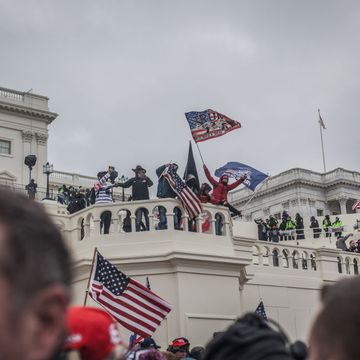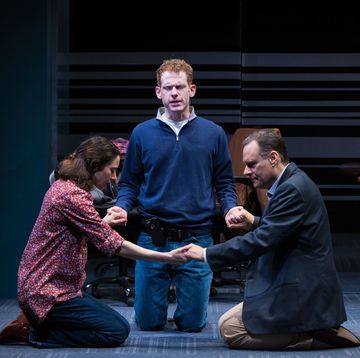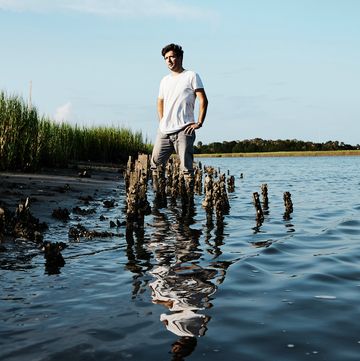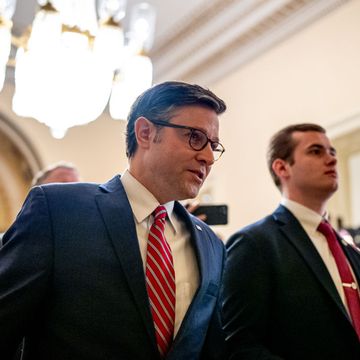In February 2012, Paul Volkman, a Chicago physician, was sentenced in a Cincinnati federal court to four consecutive life terms for illegally prescribing and distributing pain medications. His and his conspirators' recklessness resulted in at least 14 deaths, four of which he was found guilty of, along with a virtual drug dealer's bingo card of other related charges. According to the Department of Justice, Volkman, dubbed the "Pill Mill Doctor" in the press, was "the largest physician dispenser of oxycodone in the U.S. from 2003 to 2005."
"Volkman was the physician at the center of a criminal scheme to distribute millions of controlled substances to hundreds of individuals in exchange for cash—a scheme that brought addiction, diversion, and death to southeastern Ohio and beyond," assistant U.S. attorneys Tim Oakley and Adam Wright said during sentencing. "During the course of this conspiracy, Volkman was the top physician purchaser of oxycodone in the country."
The case against Volkman, which made its way up to the Supreme Court before being passed back down to the 6th Circuit, where it was upheld this year, found that he operated a series of clinics throughout Ohio essentially no different than the businesses of a common drug dealer—and he even had the gun to go with them. Patients, or customers, rather, would pay between $125 and $200 in cash per visit, whereupon they would be given a prescription for pain medication, redeemable at one of his practice's own dispensaries, the employees of which were also indicted.
In short, it was a pretty big deal.
All of this came in the midst of an opioid epidemic that has continued to plague the country at large, and southeastern Ohio in particular, to this day. The National Institute on Drug Abuse estimates that over 2 million people in the country suffer from addiction to prescription opioid pain relievers, with accidental overdose deaths quadrupling between 1999 and 2012.
As such, it behooved the DOJ to make a big splash with a case as sensational as this, and each of the government agencies involved trumpeted the conviction in a series of press releases at the time. "Evidence presented during the trial showed that Volkman prescribed and dispensed millions of dosages of various drugs, including diazepam, hydrocodone, oxycodone, alprazolam, and carisoprodol," the FBI announced, a staggering number. The trial itself, which spanned eight weeks, included 70 witnesses and over 220 exhibits.
The only problem, according to one journalist who has been following the case closely for years, is that nobody can see the evidence anymore.
Phil Eil, a former news editor at the now-defunct alt-weekly Providence Phoenix and a writing and journalism adjunct at the Rhode Island School of Design, says that the government, and the DEA in particular, is illegally withholding thousands of pages of evidence about the Volkman trial in violation of the Sixth Amendment, and thumbing its nose at a Freedom of Information Act request he filed pertaining to the case almost four years ago.
"I'm the opposite of Edward Snowden," Eil tells me. "I'm just a guy who asked for trial evidence, supposedly the least sensitive and private information we have in this country."
Frustrated with the DEA's unwillingness to comply with his FOIA request in a timely manner, Eil brought suit against the agency in a filing joined by the ACLU of Rhode Island.
Eil, whose father attended college and medical school with Volkman, has been attempting to write a book about the trial and argues that—the DEA's protestations to the contrary—the public-interest angle in the case outweighs concerns about medical privacy. These concerns seem to be the DEA's reason for refusing to release anything substantive besides a mere fraction of the evidence, most of which has been redacted and rendered useless, since Eil first filed his FOAI request in February 2012.
Thus far the agency has held back 87 percent of the 12,724 pages it has processed to date pursuant to the FOIA request. Most of the 1,600 pages they have turned over are essentially blank documents.
"You can't have a true democracy without a transparent court system, and this case represents an egregious failure of judicial transparency," Eil said in a statement. "The right to a public trial is a basic tenet of our society, and it's scary to think that any trial in the United States, especially one of this magnitude, would be retroactively sealed off from public view, as this case has."
The DEA, who declined to comment on the matter or their handling of FOIA requests in general, citing the pending litigation, is not exactly known for its willingness to cooperate with such requests. Last year, Victor Hugo Michel, a journalist who submitted a request regarding Mexican drug kingpin Joaquin "El Chapo" Guzman was told he would have to pay $1.46 million to cover the cost of filing all of the paperwork. In 2013, author and researcher John Coleman sued the DEA after waiting five years for a response to his request about information on regulations for a muscle relaxant.
The department has increasingly relied on FOIA exemption 7(e) to deny thousands of requests per year—2,195 exemptions in 2011, for example, a jump from 1,024 in 2008—despite President Obama's 2009 order that government agencies err on the side of transparency. "In responding to requests under the FOIA, executive branch agencies should act promptly and in a spirit of cooperation, recognizing that such agencies are servants of the public," Obama said at the time.
"I think it's important to note that this is far from an isolated incident," J. Patrick Brown, editor of Muck Rock, a news site dedicated to streamlining the request process and archiving FOIA findings, says. "Agencies, particularly DOJ agencies, often take months or even years to respond to requests and fight the release of even the most basic information. Phil is among the few journalists who have the time, tenacity, and ability to bring the issue to court, which—as we saw in Chicago—is sometimes the only option left if you want access to that information."
Indeed, it was reporter Brandon Smith's FOIA request in the matter of the shooting of Laquan McDonald by Chicago police that forced the video to be made public.
"Agencies decry whistleblowers, pointing to these official channels, while having rendered those official channels all but useless unless you're willing to lawyer up. It's not a healthy or sustainable situation," Brown says.
The DEA was also criticized for delays when the DOJ's own Inspector General tried to investigate, finding that, "Our audit work thus far has been seriously delayed by numerous instances of uncooperativeness from the DEA, including attempts to prohibit the OIG's observation of confidential source file reviews and delays, for months at a time, in providing the OIG with requested confidential source information and documentation."
The Office of the Inspector General referred requests for comments about the DEA's compliance with FOIA requests to the DEA itself.
While the matter of medical privacy is certainly worth considering, instances of substantial public interest in prior cases have taken precedence over the Health Insurance Portability and Accountability (HIPPA) concerns, according Neil McNamara, one of the attorneys at Nixon Peabody, who took on Eil's case.
Although they thought that because a lot of the records Eil sought were introduced in public court they would constitute a waiver of privacy, that is not the case, McNamara says.
"But we're still very interested because the government has made such a public relations matter of this case and has trumpeted the conviction so much that we think that the public interest exception in FOIA really is at issue here," he explains. "If this was a run of the mill case, that would be one thing. But it clearly is not, based on the government's own action and their use of the case in a number of ways. Clearly, I think the government's own actions admit on their own part that this is a case of great public interest."
Eil is steadfast in his conviction that this is the case, as he explained when we spoke about his pending litigation and what he thinks this means for the rights of journalists and the public at large, to understand how justice is being carried out in their name.
ESQ: Have you had trouble getting anyone to pay attention to your story or for publications to pick up on it?
Phil Eil: A lot of people have been apathetic, a lot of people don't give a shit. A lot of people tell me, "Let me know when there's a development in a the case," and the point is it's been four and a half years and there hasn't been a development.
Tell us a little more about who you are.
I teach at RISD. I was at the Providence Phoenix until it closed in 2014. I'm an award-winning reporter, I've written for Rhode Island Monthly, GQ.com, the Atlantic, Vice, Salon. I have a degree from the Columbia School of the Arts. I'm not some fringe lunatic. It feels funny saying that. I am a reflection of how far this country has lost its way when it comes to transparency. That's what I'm doing as a reporter. And it just so happens that I'm yelling at the top of my lungs and have been for years, because the government can't answer a very simple question: Can I see the evidence that sent this guy to prison? I don't think this guy, as he would surely say and does say to me, is a wrongfully imprisoned man. I think it's a complicated story. But I'm not out to bust my dad's classmate out of jail. I'm just out to see the process through.
People should know about this case. The DOJ, I'm sure, would prefer that this case remain in the shadows, because they are actively taking an anti-Sixth Amendment stance. They are telling me, "No, we don't actually want to release evidence of a trial because of medical privacy."
The medical privacy thing is a major stumbling block here, right?
I am sensitive to the question of whether medical documents should be published, but that question has already been answered by prosecutors themselves when they filed these exhibits in an open court room. They are trying to say medical privacy trumps the freedom of the press and court room transparency. If and when these documents are released to me, I will have the responsibility, and it is a heavy responsibility, to decide if these should be published. But that decision doesn't belong to a prosecutor. We do not want to live in a country where a prosecutor decides what elements of trial get written about. We do not want to live in a country where we only learn about high stakes cases that send people to prison through a press release. God forbid I ever got indicted, I would certainly want my journalist friends in the court room looking at the process of justice as it unfolds, not simply getting a press release issued when I was trotted off to jail.
Why do you think the public's right to know about the specifics of this case is so strong?
Initially in 2007 when he was indicted, the government accused Volkman of causing the deaths of at least 14 patients. The government is now asking me to provide a public interest angle. That's two more than died in the Aurora shootings, just for perspective. Volkman was an unlikely convict, an MD-PhD from the University of Chicago. In 2012, a year after trial started, he was sentenced to four consecutive life terms in prison. It's an extraordinary sentence, two more than Whitey Bulger got.
You were at the trial?
I was there for the first few days of the trial. I interviewed approximately 100 people in 19 states, and I saw soon there was a book on my hands.
I got kicked out of the trial on day four. The government wasn't happy with the way I was running back and fourth between sides of the case, interviewing Volkman and other witnesses. There's not anything illegal about that, but for them there was something unpleasant about this kid they don't know going back and forth. I had been vaguely threatened by a DEA agent about a year before the trial started. I was at a law enforcement training day in southern Ohio and a DEA agent approached me and said, "Are you aware of the potential harm in what you're doing? We wouldn't want you to be charged with anything." He mentioned witness tampering.
I got handed a subpoena for testimony. I'm here to report on the trial, and they're telling me I'm going to testify tomorrow morning, which is scary, but also on a practical level it kicked me out of the courtroom. Once I was on the witness list, I can't stay in the court room. I think they were suspicious of me. They always assumed I was some agent acting on behalf of his dad's old buddy. I was running around with an axe to grind. When in fact, Volkman was a guy I'd never heard of until I'd heard about his indictment. It wasn't like he and my dad were old pals and I was going to try to fuck up the case on his behalf. Probably without much thought they said, "Here's a subpoena. We'll get the kid out of the room so he won't mess up our investigation."
This was in May 2011. In February 2012, he's sentenced. At that point I just thought, That's a drag, but I'll still be able to get the evidence. Because why wouldn't I be?
Are you still working on the book?
I still intend to write the book, a sort of sweeping panorama about how he turned into a criminal; and his town, ground zero of the opiate pandemic. But I've since fallen into this other story of how the government can't or won't release the vast majority of evidence from one of the biggest prescription drug dealing cases in the country's history. In May, it will be five years since the verdict. And February will be four years since I filed my FOIA request. The reason I'm so angry, and I am pretty much walking around in a constant of rage and disillusionment, and I feel crazy for sure, is the fact that the government won't release evidence from a trial. Particularly a trial of this import that's going to the Supreme Court, that they've touted as so important. It just doesn't jive with how this country is supposed to work.
Why do you think they have been dragging their heels on this for so long?
That's the million dollar question. I think it's a combination of a number of things. First off, part of what happens when you get stonewalled is you don't know why you're in the dark. The number-one thing is anxiety over releasing sensitive medical information, and there is actually an interesting legal question at the heart of my case. We don't freely publish people's medical information in this country. And the vast majority of information in this case is medical information: death certificates, prescriptions, exam reports, everything the government used to point out that this guy was not a doctor but a drug dealer. So I understand they are sensitive medical documents that in another context wouldn't be published. However, they were shown in an open court. I say courtroom transparency rules that go all the way back to Sixth Amendment are more important than the medical privacy. And anyway, the stuff was already shown in public. I think that's the number one reason they're so slow.
There is also a component of pretty significant incompetence and government bureaucracy. When you file a FOIA request, it's not like mine was egregiously handled in a vacuum; it was handled by an agency in the Department of Justice that routinely egregiously handled FOIA requests and an Obama administration that is setting records for poorly handling FOIA.
How much have you actually seen of the evidence?
At this point, I haven't sat down and figured out what percentage of the evidence I have. If I had to guess, generously maybe 10 to 15 percent. I do have a few exhibits. But the Sixth Amendment doesn't say reporters have a right to get about 15 percent of your trial. It says you get a public trial. I have plenty of the useless documents as well, death certificates where everything is blacked out but the date and cause of death. There have been numerous releases to me at this point by different government entities, which do not match in terms of what is redacted. It's like they're just fucking improvising. You would think if this was a law, it would be mathematical equation, and I would get the same stuff every time.
In the piece I published on Dan Kennedy's blog, I explained how in 2013 when they were fighting against Volkmann's appeal, prosecutors published a chunk of the evidence pretty much un-redacted, which indicates they have already broken the privacy line they're defending here. The fact that there are glaring inconsistencies in logical things that don't make sense doesn't get me anywhere.
It seems that this has all been pretty frustrating to deal with.
I'm a fairly normal guy who has become an activist. I don't want to use the word "radicalized" because that word carries a lot of connotations—but this has turned me into an activist. Because I will damn well accept the title "activist" if you need to be an activist to see the evidence that sent someone to prison in this country. If that makes me an activist, so be it. I am not some InfoWars conspiracy theorist. I'm a journalist and newspaper editor who's been published in the Atlantic and Vice, and I've seen that the things the country says about itself are not true. The Sixth Amendment, which guarantees you a right to a public trial, comes with an enormous asterisk. The First Amendment just got crossed out because the prosecutor didn't want me in the room. The FOIA, which Obama said in a memo in his first day in office should be administered with a presumption of openness, which would presumably apply to previously shown court evidence, is being ignored. When I complained to my congressman, all I got was a fancy letter on letterhead, which said, "They passed your information to the DEA." I have a letter from the judge who presided over this case telling me personally, "I'm not going to give you this evidence." This was a judge on the day I was kicked out of the trial who suggested sending FBI agents to Columbia to check that I was enrolled there. I know I sound like a wacko at this point, but I'm a guy who's been waiting for years. The latest thing: a couple days ago, the DEA filed something with the local court that said I hadn't articulated a significant public interest that would be served by the release of this evidence. This is about a guy they put in prison for four life terms, that they talk about as one of the biggest dispensers of oxycodone in the country, who they think killed 14 people, and they want me to articulate a public interest that would be served by seeing the evidence. It's enough to drive you insane.
I fully admit this is my side of the story. I happen to think it's right. I happen to know what I've been through. The head of the agency just called medical marijuana a joke. I don't want to get too ad hominem about them. I really don't want to be the guy who's saying, "Look how big and bad the DEA is." I just want to see this trial evidence. In fact, it's really unfortunate we ever got to this point. I never planned to sue the government, I never planned to call myself an activist. I never envisioned being kicked out of a trial. I just wanted to see what happened to this former classmate of my dad's who had taken a number of wrong turns. And I ended up learning a lot of really difficult lessons about this country in the process.

Luke is a writer from Boston who writes the newsletter Welcome to Hell World and author of a book of the same name.













